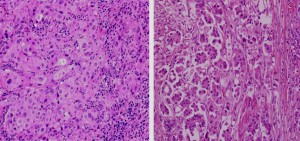-

Mayo Clinic Scientists Propose a Breast Cancer Drug for Bladder Cancer Patients
ROCHESTER, Minn. ― Jan. 21, 2014 ― Researchers at Mayo Clinic have found amplification of HER2, a known driver of some breast cancers, in a type of bladder cancer called micropapillary urothelial carcinoma (MPUC) and have shown that the presence of HER2 amplification is associated with particularly aggressive tumors. These findings suggest that administering trastuzumab to MPUC patients with HER2 amplification could improve outcomes, just as it has for breast cancer. The study is published in this month’s Modern Pathology.
Journalists: B-roll of images and sound bites with Dr. Cheville are available in the downloads.
As with breast cancer, HER2 amplification in MPUC results in a faster growing form of cancer that spreads quickly and has a higher chance of recurrence. The hope is that combating this amplification with trastuzumab, a drug that is effective in HER2 positive breast cancers, will result in effective therapy against bladder cancer.
“These findings show it is critical for pathologists to recognize this type of bladder cancer and that providers should be aware of and order the appropriate tests,” says John Cheville, M.D., a Mayo Clinic pathologist and lead author of the study. “This will be essential for any clinical trial examining the effectiveness of trastuzmab in treating MPUC.”
The study identified HER2 amplification in 15 percent of patients with MPUC, compared to 9 percent of typical bladder cancers. Patients with HER2-amplified MPUC were more likely to have aggressive tumors than patients whose tumors did not have HER2 amplification, according to this study.

“Targeted treatments for HER2 positive breast cancer have led to markedly improved survival,” says Dr. Cheville. “In one sense, what we are trying to do with HER2 positive bladder cancer is a relatively simple thing. We are trying to identify prognostic and therapeutic biomarkers, and ultimately match the most effective drug to the individual patient’s tumor, rather than its location in the body.”
HER2 is a very important target in breast cancer therapy, and gene amplification occurs in approximately 20–30 percent of cases, says Dr. Cheville. Using the latest molecular techniques, researchers in the Mayo Clinic Center for Individualized Medicine’s Biomarker Discovery Program determined that some bladder cancers similarly show HER2 amplification and produce too much of the HER2 protein product, resulting in more rapid tumor growth and expansion.
This type of individualized therapy represents the future of cancer care, and findings like the one reported in Modern Pathology are only the beginning of many more to come, Dr. Cheville says. Last year, the Biomarker Discovery Program identified and validated 12 different molecular/genomic markers, most of them related to the diagnosis, treatment and prognosis of a variety of cancers.
###
About Mayo Clinic
Recognizing 150 years of serving humanity in 2014, Mayo Clinic is a nonprofit worldwide leader in medical care, research and education for people from all walks of life. For more information, visit 150years.mayoclinic.org, www.mayoclinic.org and newsnetwork.mayoclinic.org.
About the Mayo Clinic Center for Individualized Medicine
The Center for Individualized Medicine discovers and integrates the latest in genomic, molecular and clinical sciences into personalized care for each Mayo Clinic patient. Visit http://mayoresearch.mayo.edu/center-for-individualized-medicine for more information.
MEDIA CONTACT:
Sam Smith, Mayo Clinic Public Affairs, 507-284-5005, newsbureau@mayo.edu







